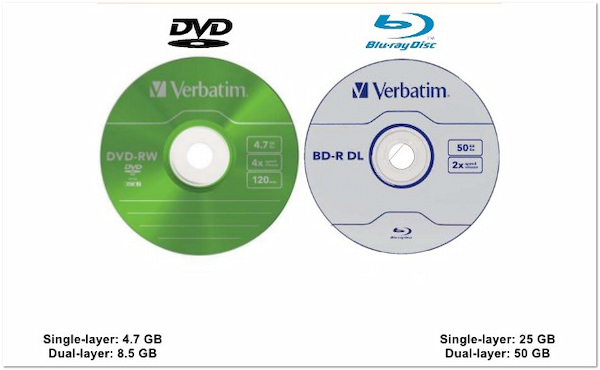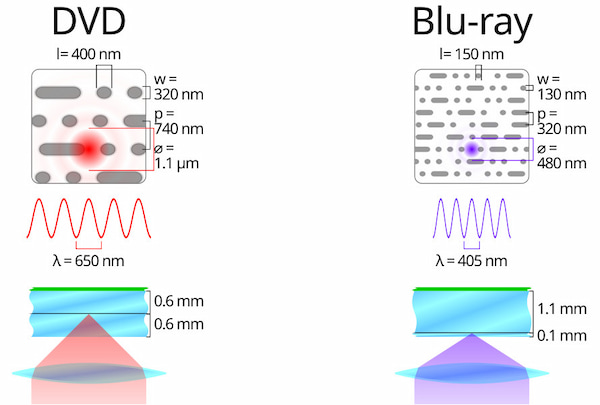The ongoing Blu-ray vs. DVD debate continues to spark discussion among movie lovers. Both formats share the same disc shape and purpose, but they differ in several aspects. This includes the quality, capacity, and technology being used. As digital streaming platforms grow more dominant, it's easy to overlook physical media. However, Blu-rays and DVDs still offer advantages that streaming simply can't match. Some of these are true ownership, consistent payback quality, and exclusive content. This post aims to provide a clear and comprehensive comparison of Blu-ray and DVD. We'll break down the key differences of the formats in terms of quality, storage capacity, compatibility, and more.

In physical media, Blu-ray disc vs DVD are two of the most commonly used formats. Although they seem similar in physical appearance, they differ greatly in several aspects. Their primary differences include data storage capacity, playback quality, and technological advancements. Understanding these differences can help you determine the right format for your intended use.
Blu-ray is a high-definition disc format developed as the successor to DVDs. It gets its name from the blue-violet laser it uses to read data, which has a shorter wavelength than the red laser used in DVDs. This shorter wavelength allows Blu-ray discs to store significantly more data.
Curious about what truly makes Blu-ray better? Discover the full Blu-ray definition here!
DVD, or Digital Versatile Disc, is a disc storage format that replaced VHS tapes. It was primarily used to store movies in digital format, offering better picture quality than VHS. However, DVDs are slowly becoming outdated with the rise of HD/4K content and digital streaming.
| VS | ||
| 25 GB for single-layer 50 GB for dual-layer |
Storage Capacity | 4.7GB for single-layer 8.5 GB for dual-layer |
| Up to 1080p Full HD; 4K with UHD Blu-ray | Resolution | Up to 480p SD |
| Blue-violet laser (405 nm wavelength) | Laser Technology | Red laser (650 nm wavelength) |
| DTS-HD Master Audio and Dolby TrueHD | Audio Quality | Dolby Digital (AC-3) |
| 12 cm, but higher data density | Appearance | Same size as Blu-ray, but lower density |
| More scratch-resistant | Durability | Good |
| Expensive | Cost | Cheap |
| Preferred for HD content and newer movies | Popularity | Common for older media |

In terms of Blu-ray resolution vs. DVD, Blu-rays offer far better video quality. They support Full HD video at 1080p resolution, providing more details and clarity. They also support 4K Ultra HD, delivering four times the resolution of 1080p. In contrast, DVDs can only project SD video with a maximum resolution of 480p. As a result, video appears grainy or pixelated on larger screens.
Blu-rays support lossless audio formats like DTS-HD Master Audio and Dolby TrueHD, offering studio-quality sound. These formats keep the original audio without compression, allowing a truly cinematic experience. DVDs, on the other hand, use Dolby Digital (AC-3), which is a compressed surround sound format. This makes them less ideal for newer technologies.

Which has a larger storage capacity: DVD-R or Blu-ray? A single-layer DVD can hold 4.7 GB of data, while a dual-layer DVD can store up to 8.7 GB. These capacities are sufficient to store a full-length SD movie. Conversely, Blu-ray discs have expanded storage, with 25 GB on a single-layer and 50 GB on a dual-layer. UHD Blu-ray discs can go even higher, up to 100 GB.

Blu-ray discs use a blue-violet laser with a shorter wavelength of 405 nanometers, which enables the laser to read and write data more precisely. On the other hand, DVDs are read using a red laser with a 650-nanometer wavelength. This laser can only read data burned at a certain density, which limits how much information can be stored on each layer of the disc.
DVDs are more compatible across home media players, including Blu-ray DVD players. You can even play DVDs on computers with built-in disc drives and game consoles. In contrast, Blu-ray discs require a Blu-ray player or a device with Blu-ray drive support.
Though most Blu-ray players can read DVDs, the reverse isn't true. If you want to enjoy Blu-rays and DVDs smoothly, use AnyMP4 Blu-ray Player. It is a one-stop media playback software fully compatible with Windows and Mac systems. It supports playback of Blu-rays, DVDs, BDMV folders, VIDEO_TS folders, and ISO files. It supports up to 4K UHD resolution and DTS-HD Master Audio and Dolby TrueHD sound. In addition, it can play Blu-rays and DVDs from different regions without any restrictions.
Secure Download
Secure Download

DVDs are more affordable, both in terms of blank disc pricing and commercially produced media. On the other hand, Blu-rays are more expensive. Blu-ray discs cost more to manufacture and purchase, and the players are more expensive than their DVD counterparts.
Important Note: Commercial DVDs and Blu-rays come with a region code to prevent unauthorized copying and distribution. If your disc is not compatible with your player's region, you need a DVD or Blu-ray region code remover to unlock discs instantly.
DVDs remain available and are still the default format for personal recordings and retail movie releases. Conversely, Blu-ray availability has increased over the years, especially for blockbuster films. However, it may still be less accessible than DVDs in certain locations.
If you have a collection of digital home movies and personal videos, it's better to keep them on a physical disc to avoid video corruption. AnyMP4 DVD Creator is multifunctional disc authoring software that offers DVD and Blu-ray burning modes. It is built to help you create high-quality DVDs and Blu-ray discs from your favorite video files.
Secure Download
Secure Download

This powerful software can import most media stream formats, including MP4, AVI, MOV, and 500+ others. As for the supported disc type, it can output DVD-5, DVD-9, BD-25, and BD-50. You can also save the media as a VIDEO_TS folder, BDMV folder, or ISO file for later burning. Best of all, it allows you to create customized disc menus with built-in templates of different themes. You can personalize menus by adding background images, music, and intro films. Also, it includes a built-in editor to enhance your videos.
When it comes to Blu-ray writer vs. DVD writer, DVDs are well-suited for recording. They work best if you're using a DVD recorder or burning data from your computer. Blu-ray discs also support recording, with Blu-ray types like BD-R (recordable) and BD-RE (rewritable).
These days, streaming services have become the dominant way people consume media. The convenience, accessibility, and on-demand nature of streaming have transformed how we watch content, leading many to believe that physical discs like Blu-ray and DVD may be approaching obsolescence. However, despite the digital takeover, physical media still hold significant value for many users:
Looking ahead, the future of physical media may shift toward high-capacity formats. Although mainstream usage may decline, physical discs are unlikely to disappear entirely. Instead, they may evolve into a specialized but enduring segment of the entertainment landscape.
Can I play a Blu-ray on a DVD player?
No, you cannot play a Blu-ray disc on a standard DVD player. If you want to watch Blu-ray discs, you'll need a dedicated Blu-ray player like AnyMP4 Blu-ray Player, which is a Blu-ray DVD player software to open Blu-ray and DVD discs from any region.
Is Blu-ray being phased out?
No, Blu-ray is not completely phased out. However, its popularity is declining due to the rapid growth of digital downloads and streaming services.
Blu-ray vs DVD: main advantage?
Blu-ray's main advantage over DVD is its superior video and audio quality. Blu-ray supports high-definition resolutions up to 4K, whereas DVDs can display 480p.
Blu-ray vs DVD may differ greatly, but they serve the same purpose. Blu-rays stand out with their high-definition quality, whereas DVDs are perfect for standard-definition content. If you're a casual viewer on a budget, DVDs are still a reliable and cost-effective choice. But if you're a cinephile who wants the best in quality, Blu-ray is the clear winner. To get the most out of your physical media, use AnyMP4 Blu-ray Player for smooth Blu-ray and DVD playback in excellent quality. If you want to easily burn your videos onto physical discs with menus, AnyMP4 DVD Creator is what you need.
Which format do you prefer and why: Blu-ray or DVD? Share your thoughts in the comments below!
Secure Download
Secure Download